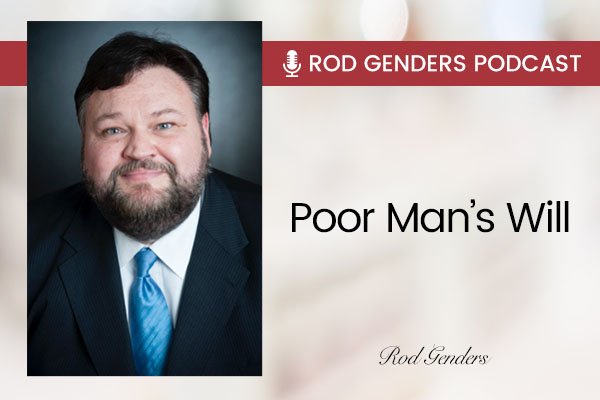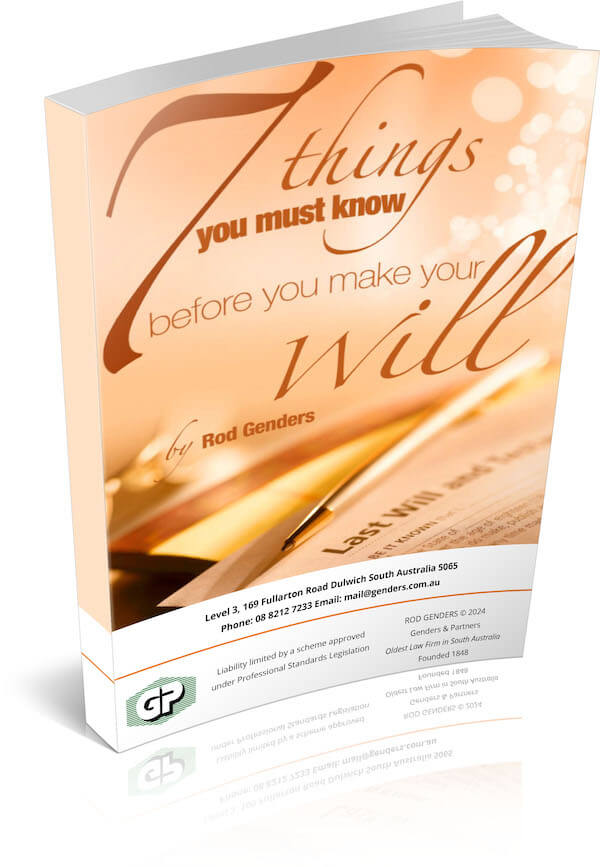
Joint accounts with other people are a common method for ageing persons seeking help with money management, but this can cause problems.
What is Joint Tenancy
Joint Tenancy is used often by couples as a means of owning shared assets. There are some good reasons to do this, but there are also some drawbacks.
Joint accounts are often referred to as a “poor man’s Will” because they allow an individual to give assets to another upon death without going through the probate process. Some people have the perception from hearing horror stories that probate will consume the entire estate.
In an attempt to avoid the court system, lawyers and taxes, many individuals set up joint accounts, believing this will simplify the process and allow the other account holder easily to obtain the money following one’s death.
This can work well for married couples in a long-standing traditional relationship and no complicating factors. For example Mum & Dad have been married to each other for 50 years and own everything jointly.

When Dad dies, everything automatically passes to Mum by right of survivorship, meaning that there are no assets in Dad’s name alone, and therefore there is no need for probate in his estate. Mum gets the lot by right of survivorship, so there are no probateable assets in Dad’s estate.
However this method might not work so well where it is a second (or subsequent) marriage or relationship. The ‘Blended Family’ situation is increasingly common in Australia, and this creates special issues which requires careful estate planning.
If Dad had remarried, and he leaves everything to his wife, then eventually the beneficiaries under his SECOND (or subsequent) wife’s estate will inherit everything – meaning that unless Dad’s biological children contest (sue) HIS estate shortly after he dies, they may well miss out entirely.
Joint tenancy is also problematic where the joint owners are not ‘relationship-partners’ ie where this strategy is attempted between parent & child.
Unfortunately, many parents have the naïve perception that the child they designate as joint account holder will treat the other siblings fairly. Complicating the process is a common belief that having a Will avoids probate.
As a result, many individuals set up a joint account, have a Will that divides everything equally, and then expect the surviving joint account holder to divide it in accordance with the Will.
Often, someone will question whether the surviving joint-account holder is the owner of those funds or whether the account was set up for convenience of distribution.
If there are no formal documents to determine the answer, the beneficiaries named in the Will no doubt will feel aggrieved and want what they believe is their fair share. Litigation is often the result.
Disputes among family members can become highly emotional and these controversies can permanently end relationships. Stress, delay and high legal costs are a consequence of the emotionally-fuelled dispute.
Joint Tenancy Vs Tenancy in Common
There are other ways to structure joint ownership. One is “tenancy in common,” which lets each party own one half, or a determined percentage or fraction of ownership.
Each person has the right to sell their share without the other party’s approval or consent and the portion of ownership can be bequeathed under a Will.
Under tenancy in common, ownership of the asset does not automatically transfer to the surviving account owner, when the first owner dies. It passes according to the deceased person’s Will.
Whilst both arrangements give each party ownership rights and a share of the property, the main difference between these two kinds of tenancy is the fact that there are different rules concerning the death of one of the tenants.
Joint tenancy pertains to property ownership in which each party on the title to the property holds an individual interest in the property. An example of a joint tenancy is the ownership over a house by a married couple.
In this situation, joint tenancy comes with the ”right of survivorship”. That means that when one of the joint tenants dies, the interest of the deceased joint tenant automatically passes to the surviving joint tenant or tenants and does not form part of the estate of the deceased.
Tenancy in common, on the other hand, refers to ownership over a certain property by parties who do not automatically have a right of survivorship (for example friends or siblings). They are co-owners of the property, however their shares and interest over the property do not have to be equal and depend entirely on the agreed shares of the parties. In a tenancy in common arrangement, if one of the parties dies their interest in the property forms part of the deceased’s estate and does not automatically pass on to any co-owner of the property.
Joint Signatory Does Not Equal Joint Owner
Sometimes an elderly person wants a trusted person (child) to be able to sign documents at their bank in respect of a specific account. They might not want (or be able) to create a power-of-attorney, nor do they intend to give the child ownership of the account. They just want the convenience of someone being a joint signatory (or authorised person) to access the account on behalf of the owner.
To avoid doubt about survivorship rights, the account should be set up so that it is titled in the name of the parent only, allowing the child signatory rights. In the alternative, if the bank allows one to specify what happens to the proceeds upon death of the depositor, that should be carefully reviewed and appropriately checked.
Is It An Estate Asset
Sometimes it is not clear whether a joint account is to be regarded as an estate asset or not. A common area for disputes is when a Will states a deceased’s estate is to be distributed equally among all of the children with no reference to the joint accounts. This leaves confusion as to what the testator actually intended.
Without specific evidence indicating that the account was set up with intent that proceeds be distributed contrary to joint tenancy rules, upon the death of an account holder the surviving account-owner will often be entitled to the proceeds.
In the absence of contradicting evidence, a joint account trumps a Will. People intending to set up an account in joint tenancy for purposes of convenience or to avoid probate need to be aware that the survivor could be considered the owner of the account upon the death of the first-to-die.
This raises several immediate potential problems.
Problem Scenarios
- Who-dies-first misses out. It might not be who you expect. If the child dies first (it happens) then the elderly parent will be left as sole-surviving-owner of that asset. If the child (and his/her heirs) were counting on that asset as part of THEIR inheritance, then this arrangement has just thwarted them.
- Divided loyalties. What happens if the older person needs to use most or all of the joint-account to fund alternative accommodation later in life? This is a very common problem, where Mum puts her child as joint-tenant on the title of her house (perhaps to avoid probate, or sometimes to move him/her and their family in with her to give them a nicer house to raise their kids plus be on hand to look after Mum). However the probabilities are high nowadays that eventually Mum will need a higher level of care than the family can provide, and so she will need to buy-into a retirement village or nursing home. Granting joint-ownership means giving-up sole control of the asset, which can create real problems later.
- Family law, Centrelink and tax consequences. As joint-owner, there could be family law, Centrelink and tax consequences for ALL joint owners. If either owner gets divorced/separated, gets into financial difficulties, gets sued or goes bankrupt, then the joint asset can be attacked by THEIR creditors. In other words, the parent’s asset has just been exposed to a whole new world of potential predators. If the child has tax problems, the parent’s asset can be attacked to pay for them. Pension entitlements for both parent and child can be affected by the joint asset for the Centrelink assets & income tests.
- Estate dispute. If the joint-tenancy benefits one child, who then also benefits under the Will of the deceased joint-owner, other Will-beneficiaries might seek to argue that injustice and unfairness has occurred, and seek to challenge the estate to “even-up” the distributions.
- Wrong Account Registration. A common scenario is where the elderly parent is living with one of the children who is handling the parent’s financial affairs. The parent and child set up a joint account out of convenience, to make money management easier and simplify paying the parent’s bills. This child, who is handling the financial affairs, may feel that he/she has shouldered a heavier burden than other siblings and is therefore ‘entitled’ to the joint account proceeds. This may or may not have been the deceased parent’s intent. (See ‘JOINT SIGNATORY’ below).
- Elder abuse. Another increasingly common and worrying scenario is where broad powers of attorney have been established that allow the agent under power-of-attorney to make transfers to him or herself. Often the agent is one of the children and exercises authority after the principal’s cognitive abilities have declined. The child, (often with a sense of justification and entitlement), transfers funds into a joint bank account or another account under the child’s control. Upon the parent’s death, the joint account holder becomes the owner. This result may not be the intent of the deceased. Such conduct by an agent under power-of-attorney may represent a breach of fiduciary duty or cause other legal challenges (such as conversion or theft) that may result in criminal and/or civil legal proceedings against that agent – often after the death of the deceased, thus delaying the administration of the estate, and adding greatly to the stress, costs & delays of the administration.
Beware DIY
The Internet Age has contributed its own set of problems. Many individuals go online and obtain forms to attempt to prepare their own Will or power of attorney, or to do so for an elderly relative. Almost all of these forms are not individualised to the circumstances of the individual or the laws of their State nor explain the nuances involved in joint accounts or other matters.
Such forms are thus often “legally blind” to the reality of the laws that govern the State where that individual resides. From a practical standpoint, a lay person who sets up a joint account and/or does their own Will may save a few dollars, but they are risking big problems for themselves & their family and their estate may end up being distributed in a way that was not intended.
Anyone (especially elderly people) wanting to leave assets to a family member should take considerable care to minimise the risk of problems later on, including that the gift could be challenged or invalidated. There are steps that can be taken by an experienced lawyer specialising in estate planning to greatly assist your testamentary intentions to be made effective.
An effective solution is for proper documentation of the gift or loan to be drawn up as part of a modern integrated estate plan. When families put their arrangements into a proper legal deed or contract, it can plan for future contingencies and protect all parties. This can be very cheap insurance, to prevent litigation and family distress.
SPECIAL REPORT “7 Things You Must Know Before You Make Your Will”
In this report you will Learn:

Why home-made Wills can be a LOT more expensive than you might think.
The secret weapons used by the rich & powerful to protect their assets, and transfer their wealth two or three generations ahead.
How Estate and Trustee Companies make BIG money from “free” Wills.
The Most Common Estate Planning Mistakes, how they can cost your family a fortune, and How to Avoid Them.
The Elements of a Sound Estate Plan – why a Will alone is not enough.
How to Make Sure Your Assets Stay in Your Family and are not lost to creditors, lawsuits or ex-spouses.
How to guard against challenges to your Estate after you’re gone.







